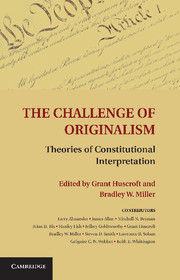Book contents
- Frontmatter
- Contents
- Preface
- Contributors
- The Challenge of Originalism: Theories of Constitutional Interpretation
- Part One Exposition and Defense
- Part Two Interpretation and Intention
- 4 Simple-Minded Originalism
- 5 The Intentionalist Thesis Once More
- 6 Origin Myth: The Persons Case, the Living Tree, and the New Originalism
- Part Three Originalism and Constitutional Settlement
- Part Four Challenges and Critiques
- Index
- References
5 - The Intentionalist Thesis Once More
from Part Two - Interpretation and Intention
Published online by Cambridge University Press: 07 October 2011
- Frontmatter
- Contents
- Preface
- Contributors
- The Challenge of Originalism: Theories of Constitutional Interpretation
- Part One Exposition and Defense
- Part Two Interpretation and Intention
- 4 Simple-Minded Originalism
- 5 The Intentionalist Thesis Once More
- 6 Origin Myth: The Persons Case, the Living Tree, and the New Originalism
- Part Three Originalism and Constitutional Settlement
- Part Four Challenges and Critiques
- Index
- References
Summary
Clearing the Ground for the Intentionalist Thesis
The first thing I want to say is that originalism, at least of the intentionalist variety, is not a theory of interpretation. Indeed I would contend that there is no such thing as a theory of interpretation because interpretation is an empirical, not a theoretical, task. That is, it is not carried out under the direction of a set of general instructions or a governing algorithm in a way that promises or guarantees a correct result. Another way of putting this is to say that there is no such thing as a method of interpretation, no sequence of steps that, if adhered to, generates a legitimated conclusion. Given that methodology is what parties to the originalist debates are typically in search of, I must confess that I find most of the contributions to those debates uninteresting. What the theorists of interpretation are after they will never find, and although the energy and ingenuity they display are considerable, their efforts, as Steven Smith says in “That Old-Time Originalism,” have become scholastic, a dizzying structure of cycles and epicycles built on a mistake. The aggressive philosophizing about originalism has produced, Smith observes, something so “cumbersome” that it provides neither light nor guidance. My argument shall be that we have the light already in the interpretive acts we perform in ordinary daily life, and that the guidance will not be forthcoming because, to repeat, interpretation is not the kind of thing there is a theory of.
There is, however, such a thing as a theory of what interpretation is, an answer to the question, “What is the meaning of a text?’ That is a theoretical question because of the level of generality at which it is posed. Not “What does this particular text mean?” but “What does any text mean?” or, to rephrase in operational terms, “What does it mean to seek – try to figure out – the meaning of any text?” An answer to that question will not tell you how to interpret what procedures to follow, but it will tell you what you are doing when you interpret; therefore, it will also tell you what you cannot do and still claim to be interpreting.
- Type
- Chapter
- Information
- The Challenge of OriginalismTheories of Constitutional Interpretation, pp. 99 - 119Publisher: Cambridge University PressPrint publication year: 2011
- 4
- Cited by

